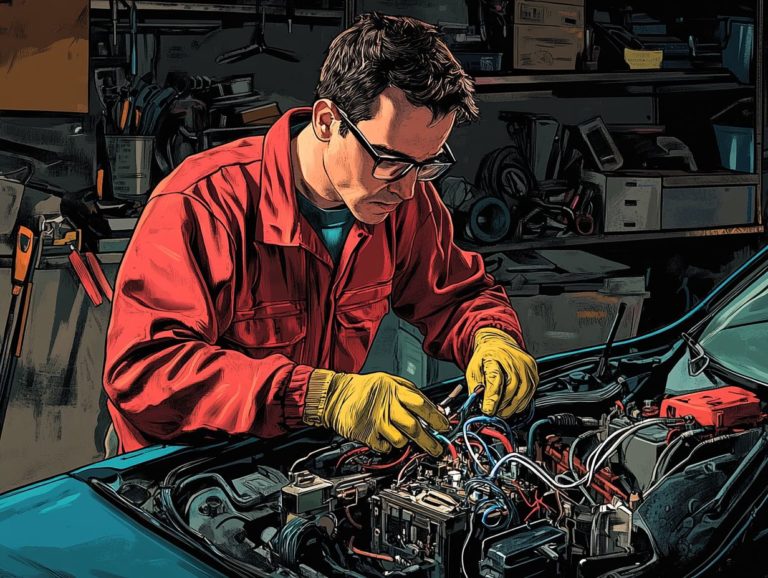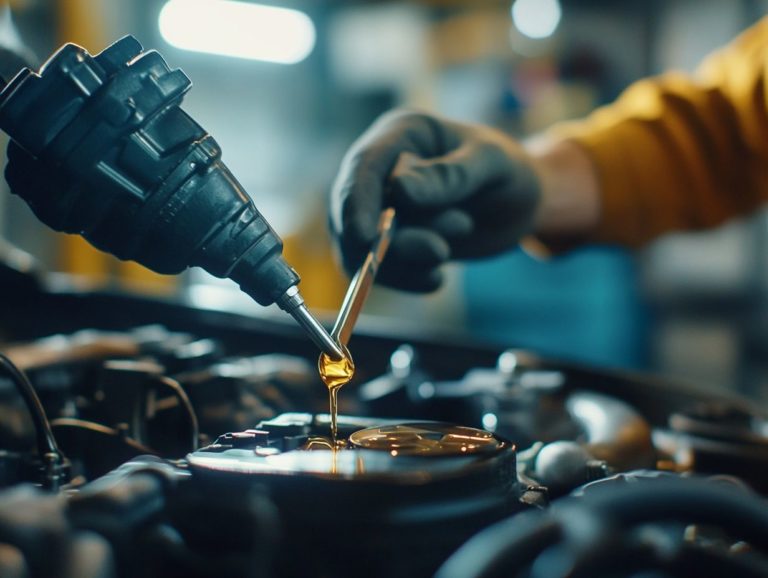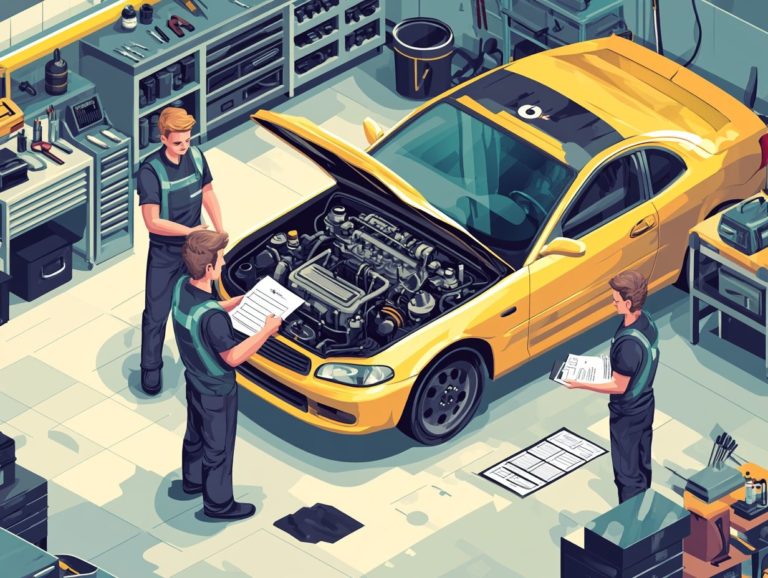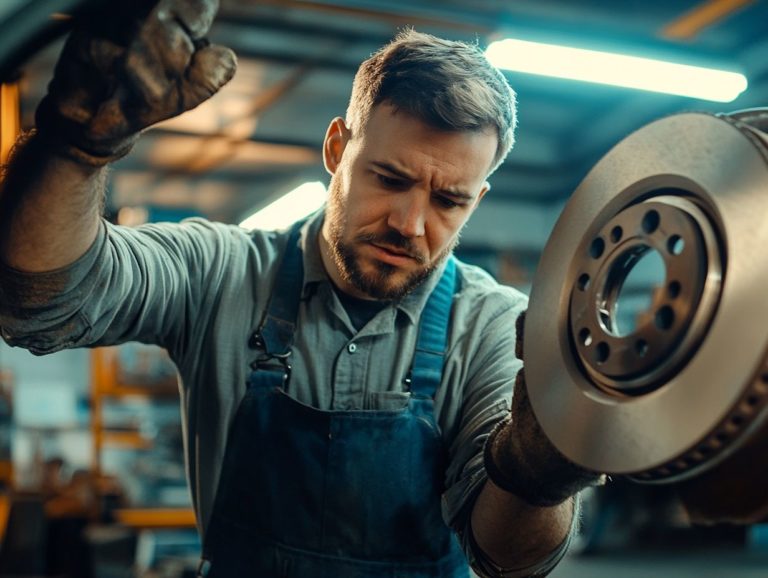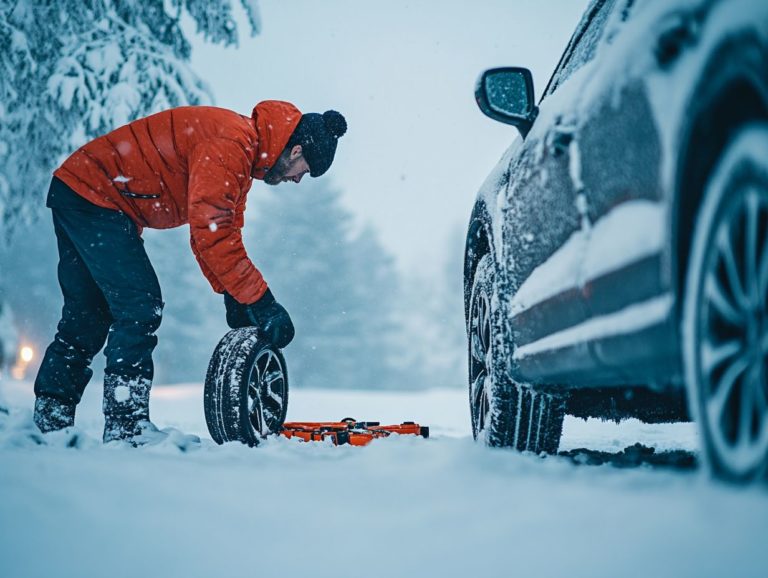What Should You Do If Your Car Overheats?
Car overheating can transform a routine drive into a high-stress scenario, affecting both your safety and your wallet. It s essential for you to understand the causes and warning signs of overheating.
This guide will walk you through the immediate actions to take when your car overheats, provide vital maintenance tips to keep overheating at bay, and outline steps to follow if the issue continues.
Armed with this knowledge, you’ll be well-equipped to manage and prevent overheating in the future.
Contents
- Key Takeaways:
- Understanding Car Overheating
- Immediate Steps to Take
- How to Prevent Car Overheating
- What to Do If Your Car Continues to Overheat
- Frequently Asked Questions
- What Should You Do If Your Car Overheats?
- What could be causing my car to overheat?
- What precautions should I take to prevent my car from overheating?
- What should I do if my car continues to overheat after pulling over?
- Is it safe to drive my car after it has overheated?
- What should I do if my car overheats in heavy traffic?
Key Takeaways:
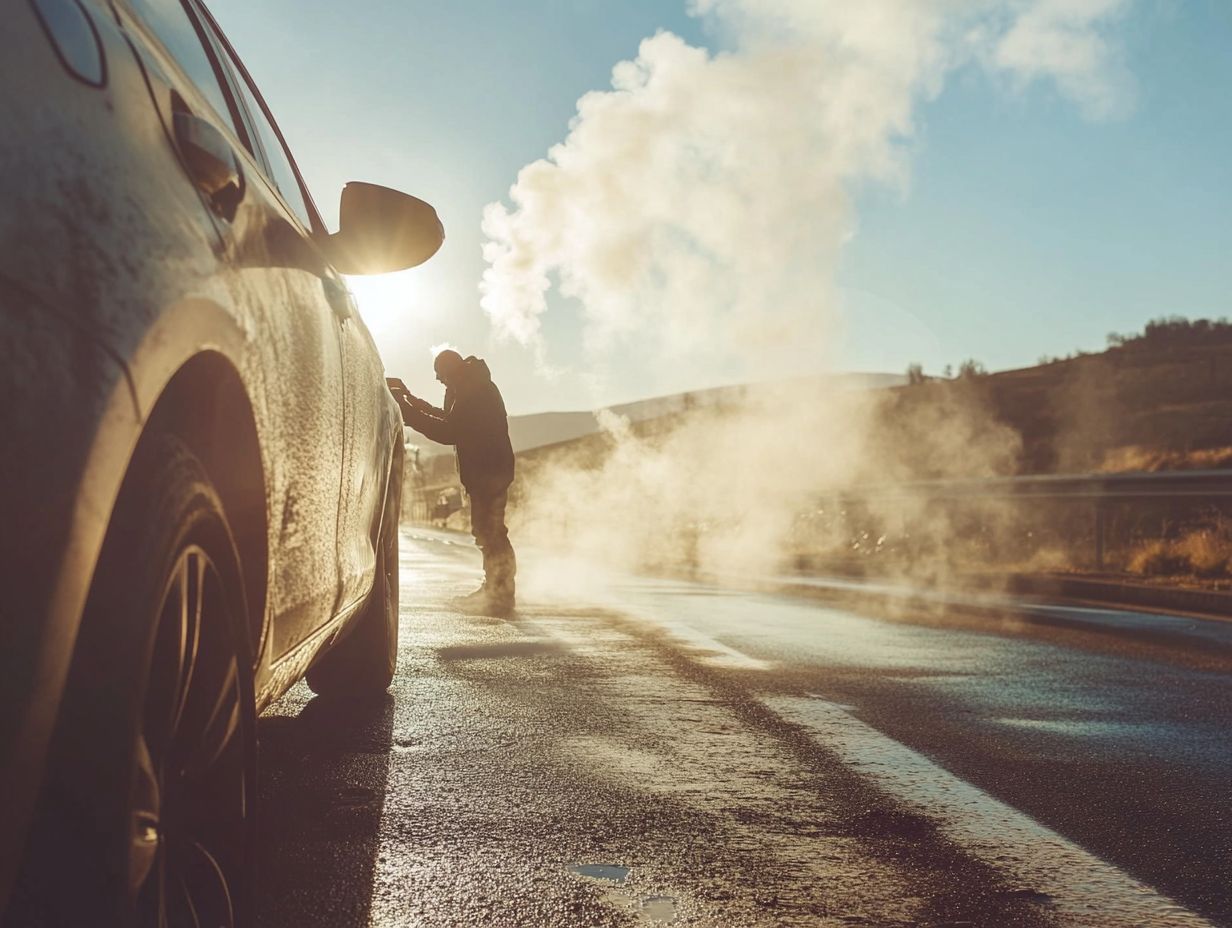
- If your car overheats, pull over immediately and turn off the engine to prevent further damage.
- Regular maintenance and monitoring of warning signs can prevent car overheating.
- If your car continues to overheat, seek professional help. Consider solutions like coolant replacement or repairing the cooling system.
Understanding Car Overheating
Understanding car overheating is vital for you as a vehicle owner. High temperatures can put a serious strain on your engine.
An overheating engine diminishes your car s performance and can lead to costly repairs if not addressed quickly.
Look out for common signs that your vehicle might be overheating like warnings from the temperature gauge, steam rising from the radiator, or unusual noises coming from the engine compartment. Recognizing these signs is key for your family’s safety and peace of mind!
Causes and Warning Signs
The causes of car overheating can vary, often stemming from problems within the system that keeps your engine cool. You might find insufficient coolant levels, a failing water pump, or even a blocked radiator at the root of the problem.
Recognizing the warning signs is essential; for example, if your temperature gauge ventures into the red zone or you spot steam wafting from under your hood, those are critical indicators that your engine is overheating.
A malfunctioning thermostat can impede the proper flow of coolant, putting your engine under stress and risking potential damage. Clogged coolant passages can also be a common culprit, restricting the necessary flow to maintain optimal engine temperature.
Regular maintenance checks are your best defense, as they help identify early signs of these issues before they escalate. Ensuring your vehicle has adequate coolant, inspecting hoses and connections, and replacing old or worn-out components are straightforward yet effective preventative measures.
By prioritizing routine inspections, you can significantly diminish the risk of overheating and extend the lifespan of your engine.
Immediate Steps to Take
When your car starts to overheat, act quickly! Your prompt response could save your engine from serious damage! Safely pull over to the side of the road, turn off the engine, and let it cool down.
Once you ve done that, pop the hood to release the built-up heat and check the coolant levels in the radiator. If needed, add coolant or water to the system, but make sure the engine is cool to avoid burns.
Neglecting these steps can lead to costly repairs and put your vehicle at risk of breakdowns when you need it most.
What to Do When Your Car Overheats
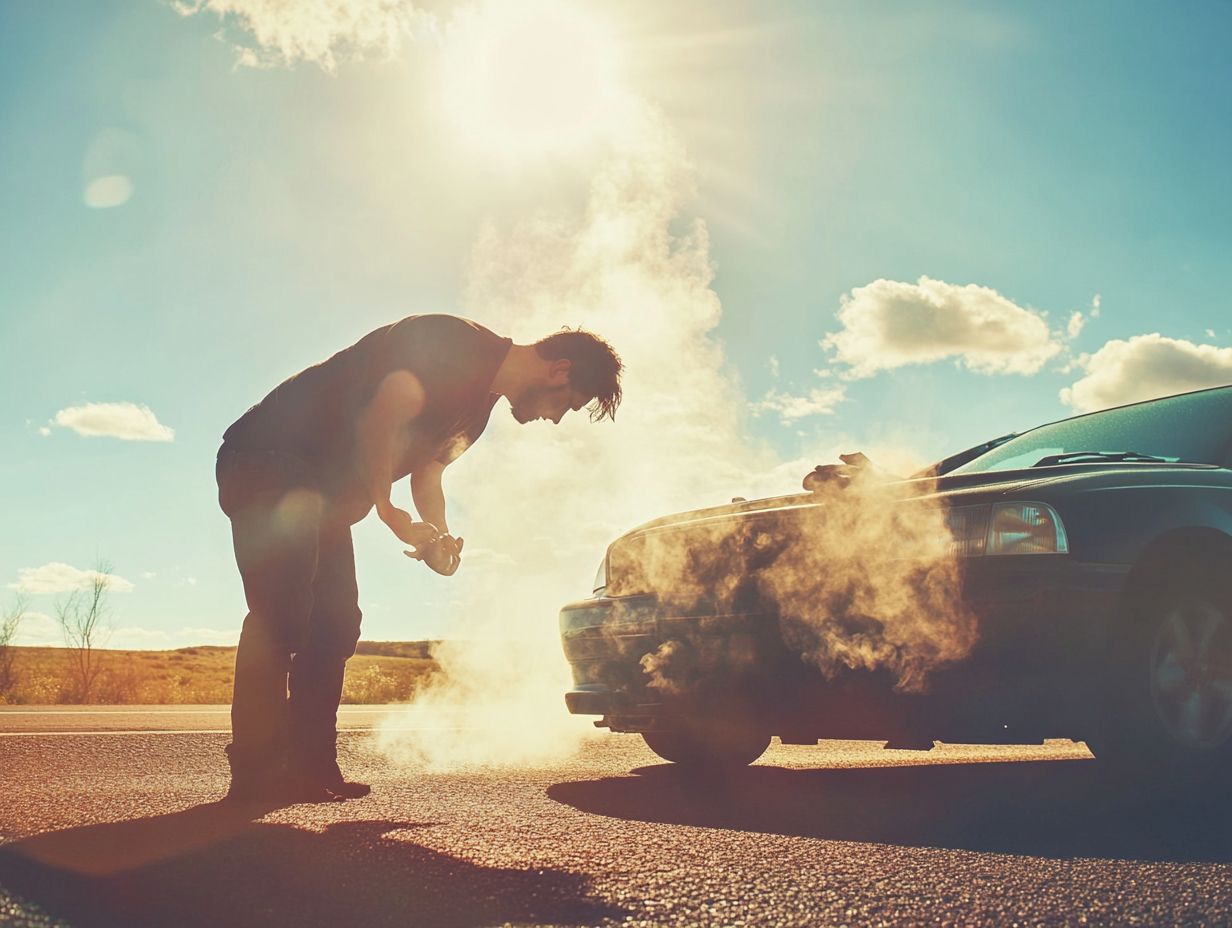
When your car overheats, your first step is to find a safe place to park and turn off the engine. This prevents further damage to its parts.
After stopping, check the coolant levels in the radiator. If they’re low, adding coolant may offer a temporary fix.
However, it s essential to have your vehicle inspected by a professional as soon as possible for maintenance and repairs.
Coolant management is essential for keeping your engine at a safe temperature. Regularly monitoring the radiator can help you spot leaks or deterioration before they escalate into serious problems.
Maintaining proper coolant levels and ensuring your radiator is in good condition can significantly reduce the risk of overheating, extending the life of your engine.
Regular maintenance like flushing the cooling system and checking hoses for wear not only boosts your vehicle’s performance but can also save you from costly repairs.
By staying vigilant, you ll enjoy a reliable driving experience and greater peace of mind on the road.
How to Prevent Car Overheating
Preventing car overheating is essential for vehicle owners, especially during hot summer months when engine temperatures tend to rise. Regular maintenance checks are vital to ensure that your cooling system including coolant levels, radiator, and water pump is operating effectively.
Routine inspections allow you to catch potential issues before they become serious problems, helping your engine run efficiently and minimizing the risk of overheating. By taking these proactive steps, you safeguard the longevity of your vehicle and the safety of your family.
Maintenance Tips and Practices
Effective maintenance practices are crucial for preventing your car from overheating and ensuring that your engine operates at peak performance.
Regularly check coolant levels, inspect the radiator for leaks, and monitor the temperature gauge to catch potential issues early before they escalate into serious problems.
Schedule routine inspections with trusted service providers like Firestone Complete Auto Care or Brakes To Go to keep your vehicle running smoothly and safely.
Also, keep an eye on the condition of belts and hoses. Worn components can lead to inefficiencies. Regularly replacing the thermostat the device that helps control your engine’s temperature is crucial, as a malfunctioning thermostat can disrupt the cooling system.
Ensure that the cooling fan is operational; it plays a critical role in regulating engine temperature and overall vehicle performance.
Don t overlook the stability of the water pump either, as it circulates coolant. By taking these straightforward steps, you can protect your automotive investment from overheating and costly repairs.
What to Do If Your Car Continues to Overheat
If your car keeps overheating despite your best efforts, addressing this issue promptly is essential to avoid severe engine damage.
Ongoing overheating may indicate serious problems like a malfunctioning water pump, a clogged radiator, or leaks in the cooling system.
Don’t wait! Seek professional help immediately if your car keeps overheating. Ignoring these warning signs could lead to costly fixes and further complications in your engine s performance.
Next Steps and Possible Solutions

Once you notice the initial signs of overheating, the next steps involve checking your car carefully to pinpoint the root cause of the problem. Potential solutions could include:
- Checking and replenishing the coolant (the liquid that helps keep your engine cool)
- Repairing or replacing the radiator
- Servicing the water pump
Getting help from a professional mechanic right away can lower your repair costs and keep your car reliable on the road.
It’s essential to communicate specific symptoms to the mechanic, like fluctuating temperature gauges or unusual sounds. This will help them diagnose the issue more effectively. You should also consider routine system checks, including inspections of hoses and belts, to prevent these problems from becoming a recurring headache.
Building a solid relationship with a trustworthy service provider makes vehicle maintenance a priority and fosters a proactive approach to any potential overheating concerns. Regular upkeep can boost your vehicle’s performance and safety, keeping you on the road longer!
Final Thoughts and Recommendations
Understanding the causes and signs of car overheating is crucial for you as a vehicle owner to safeguard your engine’s health and performance. Regular maintenance, including coolant checks and routine inspections, plays a vital role in preventing overheating issues.
Staying attuned to your vehicle’s needs can save you from costly repairs and unexpected breakdowns on the road. Simple actions, such as ensuring adequate fluid levels and keeping an eye on temperature gauges, can significantly lower the risks.
It’s essential for you to adopt a proactive approach to vehicle care instead of waiting for warning signs to appear. By prioritizing these preventive measures, you not only protect your investment but also enhance the safety of your journeys.
The good news is that consistent check-ups can lead to better fuel efficiency and a smoother ride, making every trip as enjoyable as it should be.
Frequently Asked Questions
Here are some common questions about car overheating:
What Should You Do If Your Car Overheats?
If your car overheats, the first thing you should do is pull over to a safe location and turn off the engine. For detailed guidance on what to do if your car overheats, follow the recommended steps.
What could be causing my car to overheat?
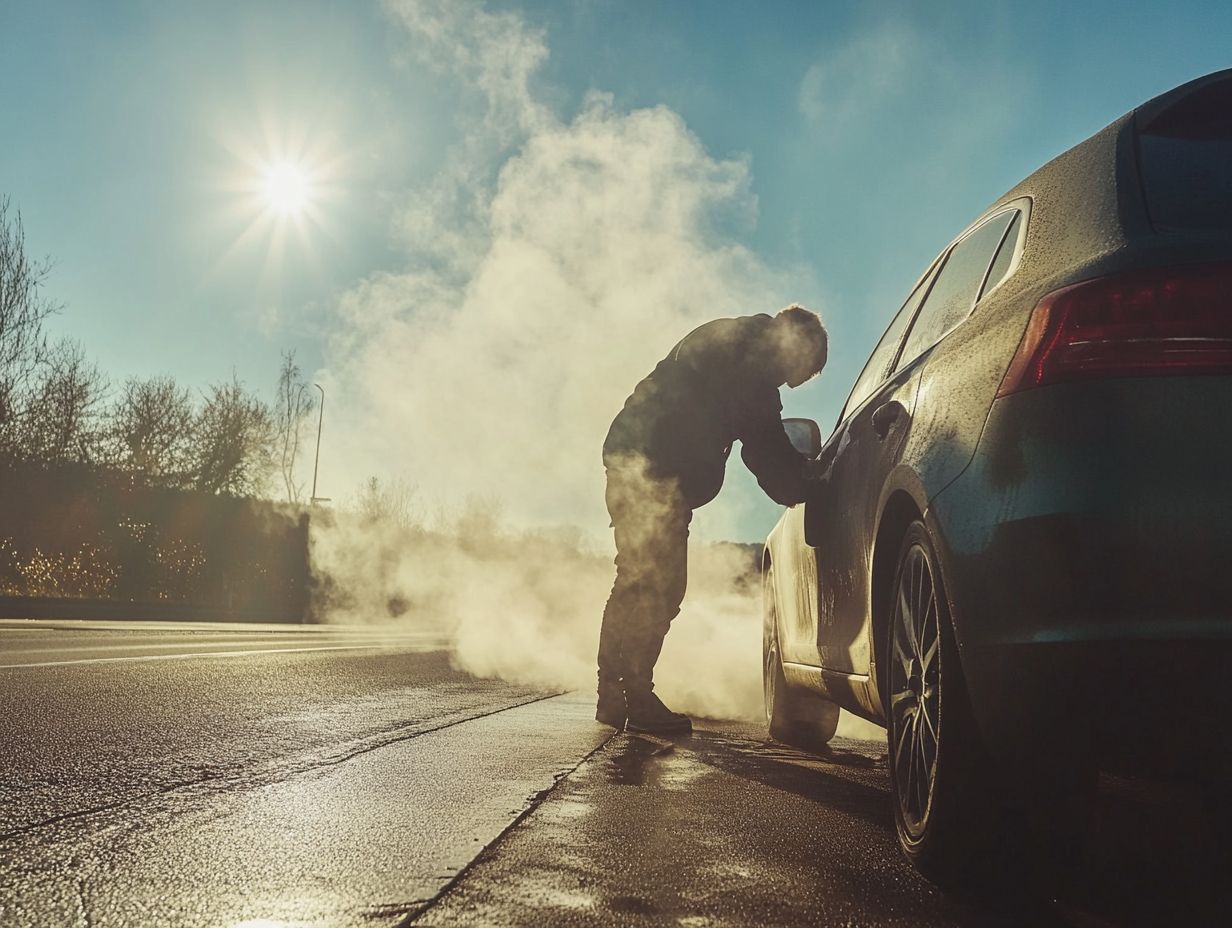
A variety of factors can contribute to your car overheating, including:
- Low coolant levels
- Faulty radiator
- Malfunctioning thermostat
- Broken water pump
What precautions should I take to prevent my car from overheating?
To avoid your car from overheating, make sure to:
- Regularly check and top off your coolant levels
- Keep an eye on your temperature gauge while driving
- Have your vehicle serviced regularly
What should I do if my car continues to overheat after pulling over?
If your car continues to overheat after pulling over, turn off the air conditioning and turn on the heater to transfer heat away from the engine. You may also try adding more coolant if available.
Is it safe to drive my car after it has overheated?
No, it is not safe to drive your car if it has overheated. Doing so can cause further damage to the engine. It is best to wait for the engine to cool down before attempting to drive again.
What should I do if my car overheats in heavy traffic?
If your car overheats in heavy traffic, try to find a safe place to pull over and turn off the engine. Turn on your hazard lights to alert other drivers, and wait for the engine to cool down before continuing to drive. It may also be helpful to have your vehicle inspected by a mechanic to determine the cause of the overheating.

